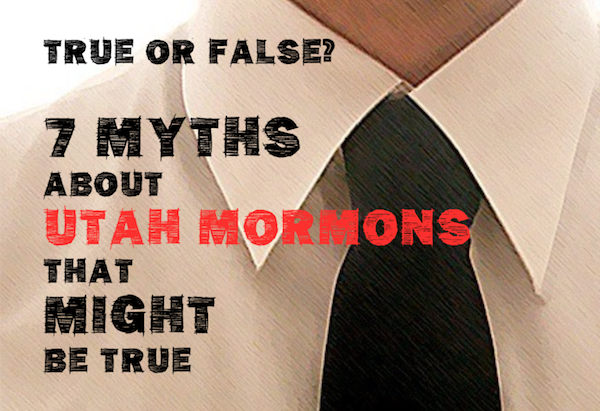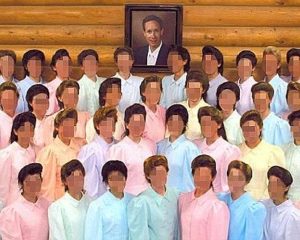Utah Mormons get a bad rap, you know? If you live in Utah, you’ve experienced it. The smug smiles from people who live in Idaho. The insane questions from people outside of the religion (“Utah huh? Isn’t that where they have all those wives?”). The complete shock from people who hear about what it’s like to date as a Utah Mormon – yes, they really do those crazy things just to ask a girl out to prom.
So I am here now to dispel most of these myths, and to prove a few others are true. Which is which? You’ll have to see for yourself.
7 Myths About Utah Mormons That Might Be True
1. Utah Mormons don’t hang out with non-Mormons.
We do, we really do. But we spend so much time in our own churches and managing our own families that it’s hard to really hang out with anyone. According to a 2012 study by the University of Pennsylvania, LDS members spend almost 250 hours on volunteer activities, with 57% of those happening inside the church building. That’s almost double the amount of time that other church members typically spend serving.
This is not to say that Mormons are so much more righteous than other people. We do have a lay ministry, though, so everyone has to work in order to make things work. We give of our time to lead choir (a typically paid position in other churches), preach (paid position in other churches), and even clean the bathrooms (paid).
All the working adds up fast. Hanging out with anyone is generally hard. But we are also around the people in our churches a lot, which is half the business of making a friend. In order to make friends outside of the church it takes special effort. Not everyone makes that effort, but many Mormons do.
2. Utah Mormons practice polygamy.
For 18 months, I served a mission in the heart of Louisiana. I can’t tell you how many times I was told that my church practiced polygamy. “No. We don’t do that anymore,” I would say.
“You must not be one of them Utah Mormons. They still do.”
Let me unequivocally state for the record that the Church of Jesus Christ of Latter-day Saints (aka, “The Mormon Church”) does not currently practice polygamy. We have not systematically practiced polygamy for about, oh, ONE HUNDRED YEARS. Here’s the official 1890 manifesto, if you’d like to fact-check that.
Now, let’s be clear and honest here: there are groups in Utah that DO still practice polygamy. The Fundamentalist Church of Jesus Christ of Latter-day Saints
(FLDS), the Kingston Group (Latter Day Church of Christ), and other polygamous offshoots do exist in Utah, but are in no way endorsed by, supported by, or affiliated with the LDS church.
3. Utah Mormons are pill-popping perfectionists.
There is truth to this myth, but maybe not as much as you think. Sixty-five percent of Utah residents are members of the LDS church, and the state has been in the top 10 for national opioid overdose deaths for almost 20 years.
Yet, in the most recent year of information, the state moved into the 12th national position after a number of aggressive reforms were made including a million-dollar ad campaign to teach the mostly Mormon population about the connection between opioids and heroin usage. The state’s largest healthcare provider, Intermountain Health Care, has also taken the lead, vowing to “reduce the number of opioid pills it prescribes to patients newly diagnosed with pain by 40% by the end of next year,” according to Forbes.
Still, what about the perfectionism thing?
The “toxic perfectionism” concept is not new in the LDS faith, but it also may be an outdated trope. According to an extensive 2016 study by Jana Reiss – the largest survey of both active, inactive, and former LDS members to date – the rising generation of Mormons are much less concerned about following the rules perfectly than they are about being good people.
I am hearing that from Millennials, and more Gen-Xers as well, that they’re more interested in questions of where your heart is, where your spirit is, rather than whether you’re wearing a white shirt or tie and how you are presenting yourself to the world.
So, are Mormons pill-popping perfectionists? The answer is, “probably.” But the generation of that type of Mormon is dying out. The rising generation of the church is much more balanced when it comes to accepting their flaws and dealing with them in a healthy, non-narcotic way.
4. Utah Mormons are judgmental jerk-wads.
Well, I guess you can find judgmental jerk-wads anywhere you look. I was expecting to move to Utah and instantly be judged for not having perfect highlights or for saying “shit” in everyday conversation. Yeah. So there was a little of that.
I will illustrate this point with a short, true narrative:
When we moved to Utah, I took a job teaching middle school English. There were around 25 students in each class, and I taught four classes – so about a hundred kids.
The English Department suggested that one of the required reading books would be “The Book Thief,” by Markus Zusak. A very good book about redemption and faith in the time of Nazi Germany. After about three days of teaching the book, several parents of students complained about the “offensive language” in this book. (Pretty sure a character said the “shit” word more than once.) Out of my 100 students, about 9 students’ parents were able to sway our principal to pull the book – FROM THE WHOLE DISTRICT.
So. What does that tell you?
I don’t believe that all Mormons are judgmental jerk-wads. But I believe that about 9% may be intolerant to anything that offends a portion of their morality. Despite the benefit of a Rated-R movie, despite the value of a new member who still smokes a pipe, there are going to be people who just can’t differentiate between what Christ would do and what the handbook says. And that’s not just Mormon’s, y’all – that’s the world we live in.
5. Utah Mormons Live in a metaphorical “bubble.”
A good friend of mine, Holly Harmon, just finished writing and performing a fantastic new one-woman musical based on this exact trope. “‘Pop’ Goes the Bubble,” is about a wide-eyed girl from Provo County that goes to New York to follow her love of musical theater. With songs like “The F-Word” (which discusses the shocking nature of the word “fart” to many Mormons), and the inside jokes about fry sauce and Pioneer Day (“What do you mean they don’t celebrate the 24th of July??”), the “bubble” of Utah is clearly something that many Utahns identify with.
Truly, Utah has a number of cultural differences from even it’s closest state neighbors, including (but not limited to):
- Very few businesses are open on Sundays.
- Liquor is not available at grocery stores, and is sold only at state-run liquor stores.
- Dating is typically only done at age 16, and asking a girl to a dance is often an elaborate affair. See this video for reference.
- Church leadership’s popularity equals famous stars like Brad Pitt or Jennifer Lawrence.
- One of the first questions that transplants are asked is, “Are you a member?”
On the other hand, the bubble is really more hyperbole than not. Consider this:
Although 89.2% of the population is white, 25% of the population is below the age of 30, making Utah the second youngest state in the nation, according to the US Census Bureau. Many of these Millennials are being attracted from outside of the state by large technology companies that are finding homes in the Salt Lake area. Others are attracted to the potential mobility and ability to start businesses. For a cash-strapped generation, Utah looks like a place that many non-Utahns want to settle down in.
All of the new blood is changing the face of Utah. Salt Lake County, the area where the famous Salt lake City Temple is located, has been declining in LDS membership for over a decade. And the numbers of active members in the state is only 40%.
In addition, many members of the church from Utah serve missions outside of the state, and often outside of the country. Whilst these missions may be on behalf of the church, it still relies on donations to make these trips possible. Most churches around the country are now turning to a text to give app to help them receive these funds at a much faster rate, and it’s time that churches in Utah do the same. This can help with awareness, as well as any other positive missions that people in the church wish to complete, regardless of whether that’s in the country or out of it. That means that whatever bubble Utahns may be brought up in, it is getting popped sooner and sooner. If it’s not when they come in contact with people from other places in the schools and activities that are so popular for the child-heavy population, definitely by the time they are 18 or 19 and serving a mission to a different place or culture,
6. Utah Mormons can’t drive worth crap.
According to a 2000-point data graph of accidents and citations around the US, this myth is 100% true.
Last year, QuoteWizard ranked Utahns as the worst drivers in the nation. Specifically, they found:
Utah’s drivers are the worst in the union. They’re second in the rankings for both accidents and speeding, as well as fourth-worst for minor citations. Surprising for a state known for its non-drinking populace, Utah actually made the top 10 for DUIs, coming in at number nine.
On the other hand, Zendrive found that Utahns are one of the least distracted drivers, only spending about 4.2% of their driving time looking at or talking on a phone.
As to why Utah has such a driving problem, it’s anyone’s guess. Could there be a connection between the infamous “Standard Mormon Time” and the prevalence of speeding tickets (second highest in the nation)? Could the eternal perspective of the LDS church contribute to a more risky way of driving (“I’m too righteous to die today.”)? Who knows? The fact is simple, though – Utah Mormons suck at driving.
7. Utah Mormons assume everyone is a Mormon.
This particular form of ethnocentrism is an old myth as well. The face of Utah is changing too rapidly and dramatically for anyone to assume anything anymore. Despite business names like “Called to Surf” and local events that target Family Home Evening (See the Thanksgiving Point “Family Game Night.”), most of the population seems pretty chill about respecting every’s right to privacy about what they believe.
Still, looks can be deceiving. One commentor the ExMormon Reddit shared her struggles of having people assume her clean-cut look made her a Mormon in Utah:
My puffy blond hair and sweet demeanor makes me seem like church-lady if not Relief Society President. Some will come right out and ask, are you a Christian? or are you Mormon? Some don’t even ask and just start talking about “end times” or other Christian topics.
Perhaps there are some Mormons who are still comfortable assuming that if you live in Utah and have a nice pair of trousers on and a clean haircut, you’re a Mormon. I’m assuming those people are also asking round-bellied women when they’re due (Hint: NEVER ASK THIS).
But for the rest of us, it’s clear from everything around us – even in the bubble of Utah – that times they are a-changin’. Being a Mormon isn’t about what you look like, what you drink, or even where you live. Being a Mormon is about a dedication to living a Christ-centered, service-centered life with a deep belief in the guidance of God through past and current prophets and personal experiences. It’s a worldview that allows everyone the agency to choose whether to join or not, and it doesn’t automatically judge lacking anyone who chooses differently.
Â
Â
You Have Time for Just One More:
[su_carousel source=”category: 20″ link=”post”][su_carousel source=”category: 13″ link=”attachment”][/su_carousel]









